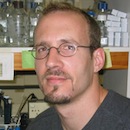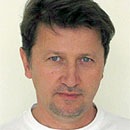Advisory Board and Editors Biochemistry

Vladimir N Uversky
Professor at the Department of Molecular Medicine of University of South Florida, College of Medicine, and Visiting Professor at Moscow Institute of Physics and Technology.
I received my B.S. and M.S. degrees in Physics from Leningrad State University in Russia in 1986, then, completed Ph.D. and Doctor of Sciences (D.Sc.) degrees in Physics and Mathematics (field of study - Biophysics) at the Moscow Institute of Physics and Technology (1991) and the Institute Experimental and Theoretical Biophysics of the Russian Academy of Sciences (1998), respectively. I spent early career working on protein folding at Institute of Protein Research and the Institute for Biological Instrumentation (Russia). In 1998, I moved to the University of California Santa Cruz to study protein folding, misfolding, protein conformation diseases, and protein intrinsic disorder phenomenon. In 2004, I was invited to join the Indiana University School of Medicine to primary work on the intrinsically disordered proteins. Since 2010, I am with USF, where I continue to study intrinsically disordered proteins and analyze protein folding and misfolding processes.
I have authored over 950 scientific publications. I am an editor of several scientific journals and edited a number of books and book series on protein structure, function, folding, and misfolding. Since 2014, I am included by the Thomson Reuters to the Clarivate list of Highly Cited Researchers™.

David Vauzour
Dr David VAUZOUR received his PhD from the University of Montpellier (France) in 2004. His research, based at the University of Reading (2005-2011), and at the Norwich Medical School, University of East Anglia, UK (2011- present), has focused on investigating the molecular mechanisms that underlie the accumulating body of epidemiological, and medical evidence, on a positive correlation between the consumption of diets rich in fruits and vegetables and a decreased risk of (neuro)degenerative disorders. In this context, his initial work provided considerable insights into the potential for natural products to promote human vascular function, decrease (neuro)inflammation, enhance memory, learning and neuro-cognitive performances and to slow the progression of Alzheimer’s and Parkinson’s diseases. His recent interests concern how phytochemicals modulate ApoE genotype-induced cardiovascular risk and neurodegenerative disorders and their underlying mechanisms. Dr Vauzour sits on the board committee of “Groupe Polyphenols” and is the Co-Chair of the ILSI Europe “Nutrition and Mental Performance Task Force“.

M. Eugenio Vazquez
I graduated in Chemistry from the Universidade de Santiago de Compostela in 1996 (with honors), and from 1996 to 2001 worked on my PhD under the supervision of Prof. José Luis Mascareñas developing new synthetic DNA-binding peptides. In 2001 I received the Human Frontier Science Program long-term fellowship and joined the group of Prof. Barbara Imperiali at the Massachusetts Institute of Technology, where I worked for three years (2001-2004) on the development of caged compounds and fluorescent probes as tools to understand complex phosphorylation pathways involved in cell motility.
I returned to Santiago with a Ramón y Cajal contract in 2004, and was habilitated three years after in 2007. Since 2010 I am enjoying an Associate Professor position at the Organic Chemistry Department, and in 2011 I became a member of the Center for Research in Biological Chemistry and Molecular Materials (CiQUS).

Alexis Verger
Senior Molecular Biologist (CR1 CNRS) at the Interdisciplinary Research Institute (IRI) - Lille 1 University - France.
My lab studies how human genes can be turned on and off by transcription factors. We investigate the fundamental mechanisms underlying specific gene control in the context of diseases, such as cancer.

Ranjit Vijayan
Dr. Ranjit Vijayan obtained his PhD in Life Sciences Interface/Biochemistry from the University of Oxford, UK, and his DipGrad in Management from the London School of Economics & Political Science, University of London, UK. In 2004 Dr Vijayan obtained his MSc in Computer Science from the University of Wales, Aberystwyth, UK, and prior to this his BEng in Electrical & Electronic Engineering, Nanyang Technological University, Singapore.
Dr. Vijayan's research interests include; molecular dynamics simulations of biological macromolecules, protein structure modeling, structure based drug discovery, genomics & transcriptomics, pharmacogenomics and high-performance computing.
Sandhya S Visweswariah
Professor in the Indian Institute of Science, Bangalore, India. Fellow of the Indian National Science Academy and Indian Academy of Sciences. J.C. Bose National Research Fellow. Recipient of a Fulbright Senior Research Fellowship and Astra-Zeneca Chair Professorship. Editorial Board Member of Tuberculosis, FEMS Microbiology Letters, Frontiers in Cellular Endocrinology, J Receptors and Signal Transduction, Physiology Reports

Jiri Vondrasek
Head of Bioinformatics Department at Institute of Organic Chemistry and Biochemistry, Academy of Sciences of the Czech republic, lecturer at faculty of natural sciences, Charles University - Prague, vice president of the Czech Bioinformatics Association and national coordinator of the European infrastructure for biological data - ELIXIR.

Liang Wang
Prof. Wang is currently a tenured full professor and distinguished medical researcher at Guangdong Provincial People's Hospital (Guangdong Academy of Medical Sciences), Southern Medical University, Guangzhou, China, where he leads a research group in intelligent medicine, digital health, and clinical microbiology. He is also an adjunct research fellow at the School of Agriculture and Food Sciences, University of Queensland (2023-2026), adjunct research fellow at the Division of Microbiology and Immunology, University of Western Australia (2023-2026), and associate professor (Nov. 2022-Oct. 2025) at the School of Medical and Health Sciences at Edith Cowan University, Perth, WA, Australia. Prof. Wang is a supervisor for PhD students at South China University of Technology (SCUT), MSc students at South Medical University (SMU) and Xuzhou Medical University (XZMU), and also supervises PhD students at the University of Queensland and the University of Western Australia.
Prof. Wang was awarded a Doctor of Philosophy Degree from the University of Western Australia in 2014 and received his postdoctoral training at Concordia University (Montreal, Canada) and Curtin University (Perth, Australia). Prof. Wang serves as an associate editor at Journal of Translational Medicine, Frontiers in Microbiology, and Gene Reports. He also serves as an editorial board member at BMC Microbiology, BMC Bioinformatics, Heliyon (Advisory Member), PLOS One (Academic Editor), Immunity, Inflammation and Disease (Emerging Editor), Translational Metabolic Syndrome Research, Future Integrative Medicine, Frontiers in Bioinformatics, iMeta, and Medicine Advances, etc. Prof. Wang is frequently invited to review manuscripts for multiple journals such as Lancet Digital Health, etc.
Prof. Wang has edited seven books and published more than 130 peer-reviewed papers in international journals such as The Lancet Microbe, npj Digital Medicine, Trends in Analytical Chemistry, ISME J, Journal of Advanced Research, BMJ Health & Care Informatics, etc. He is the recipient of the Rising Star Award in Measurement Science by the American Society for Chemistry and Australia-China Helicobacter Research Fellowship (2019), awarded by the Australia-China Council and Nobel Prize Laureate Professor Barry Marshall.

Ingrid M Weiss
Professor for Biobased Materials at IBBS - Institute of Biomaterials and Biomolecular Systems, University of Stuttgart, Germany.
Past Head of Biomineralization at INM – Leibniz Institute for New Materials, Saarbrücken, Germany and Private Lecturer "Biochemistry" at the University of Regensburg, Germany.

Claus O Wilke
Professor and Department Chair, Department of Integrative Biology, The University of Texas at Austin. Received his PhD in Theoretical Physics from the University of Bochum, Germany, in 1999. Postdoc at Caltech, 2000-2005.

Robert Winkler
Robert Winkler is Principal Investigator of the Laboratory of Biochemical and Instrumental Analysis at the CINVESTAV Unidad Irapuato and faculty member for the postgraduate programs Plant Biotechnology and Integrative Biology. His research topics include novel mass spectrometry techniques such as low-temperature plasma ionization and covalent protein staining, new approaches in the high-throughput metabolomic profiling of plants, computational mass spectrometry and proteomics.

G. William Wong
Dept. of Physiology and Center for Metabolism and Obesity Research, Johns Hopkins University.
Dr. G. William Wong is Professor of Physiology at the Johns Hopkins University School of Medicine. His research focuses on mechanisms governing metabolic homeostasis, function of adipose-and skeletal muscle-derived hormones, and mechanisms of insulin resistance and type 2 diabetes.
He received in B.S. from Washington State University and his Ph.D. from Harvard University in 2000. Dr. Wong completed post-doctoral work in biochemistry, cell biology, and physiology at M.I.T’s Whitehead Institute from 2001 - 2007. He joined the Johns Hopkins faculty in 2008.
Dr. Wong’s lab seeks to understand mechanisms employed by cells and tissues to maintain metabolic homeostasis and is currently addressing how adipose- and skeletal muscle-derived hormones (adipokines and myokines), discovered in his lab, regulate tissue crosstalk and signaling pathways to control energy metabolism.

